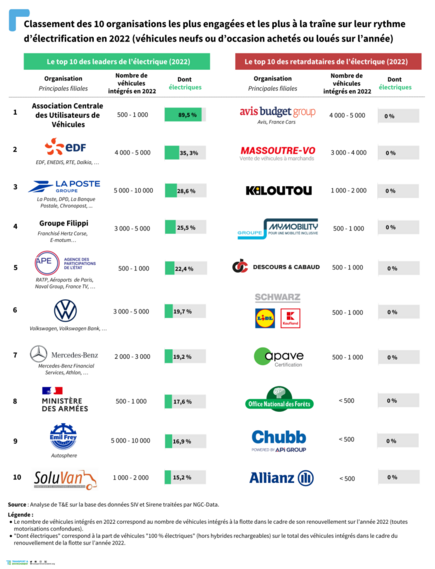The NGO Transport & Environment castigates companies, local authorities and French state administrations, which would be far, in the majority, from having reached the legal quotas for the electrification of their vehicle fleets.
Are companies, administrations and communities that manage fleets of more than 100 professional vehicles taking their fair share of the transition to electric? The NGO Transport & Environment (T&E) published, on Thursday, its first assessment of the electrification of some 6 million professional vehicles in France, thanks to data collected from the Ministry of the Interior and INSEE. The results are unflattering and show the magnitude of the task.
The State wears the dunce cap of greening its vehicle fleets
The greening quotas for 2022 were set by law at 10% for companies, 30% for local authorities and 50% for state vehicles. And as much to say that we are far from the mark. The State wins the dunce’s cap, the title of the worst student with 87% of the administrations which have not reached the legal quotas for the greening of their fleets, i.e. nearly 9 out of 10, for which electrification does not is not yet a priority.
It’s a little better within companies, but 66% of them (at least those with a fleet of more than 100 vehicles) have not reached the quotas. 64% of local authorities were below the requirements set by law. The best students are public companies, such as La Poste, EDF, Aéroports de Paris or RATP. Only 37% of them did not reach the quotas.
So how can this near-global failure be explained? Léo Larivière, Head of Fleet Electrification Advocacy at T&E France, attributes it to “ a general failure of the law “. And yet, according to him, the legal objectives are unambitious and weakly binding “. The latter indeed include the possibility of including rechargeable hybrids in the qualification of “greening”, but this does not upset the statistics more than that.
Large groups as well as a ministry totally rule out electric vehicles
Where the system has failed is that it has no real binding value. It relies solely on the goodwill of companies or administrations, since neither controls nor sanctions are possible. Within large organizations (companies and administrations), it is easy to see different strategies.
When it comes to the share of electric and plug-in hybrid vehicles in integrated vehicles in 2022, many groups are hovering around 2, 1 or even 0%. This is the case of Kiloutou (0.1%), Iliad (1.4%), Air Liquide (2%), the French Red Cross (2.4%), Avis Budget Group (Avis, France Cars; 0.6%), the Ministry of the Interior (2.7%), Altice (2.9%) and even Adecco (3%). Bouygues (8%), Veolia (8.5%) and Lidl (8.8%) are not that far and remain below the quotas. If we only focus on the renewal of the fleet in 2022 and the share of electric in all this, many companies point to 0%, such as Allianz, Lidl and Kiloutou.
Still on electrics, some organizations made real efforts last year to renew their fleet. The Central Association of Vehicle Users (89.5%), EDF (EDF, Enedis, RTE, Dalkia; 35.3%), Le Groupe La Poste (La Poste, Chronopost, La Banque Postale, DPD; 28.6 %), the State Shareholding Agency (RATP, Naval Group, Aéroports de Paris, France TV; 22.4%), Volkswagen (19.7%), Mercedes-Benz (17.6%) and the Ministry of the Armed Forces (17.6%) have started a real electrification process.

Transport & Environment also tells us, for the record, that none of the cars integrated into the fleet of the Presidency of the Republic in 2022 is 100% electric. Probably not the best way to lead by example.
Source : Transportation & Environment

18